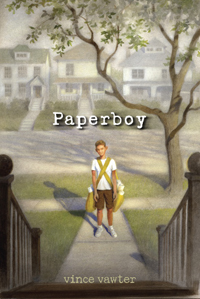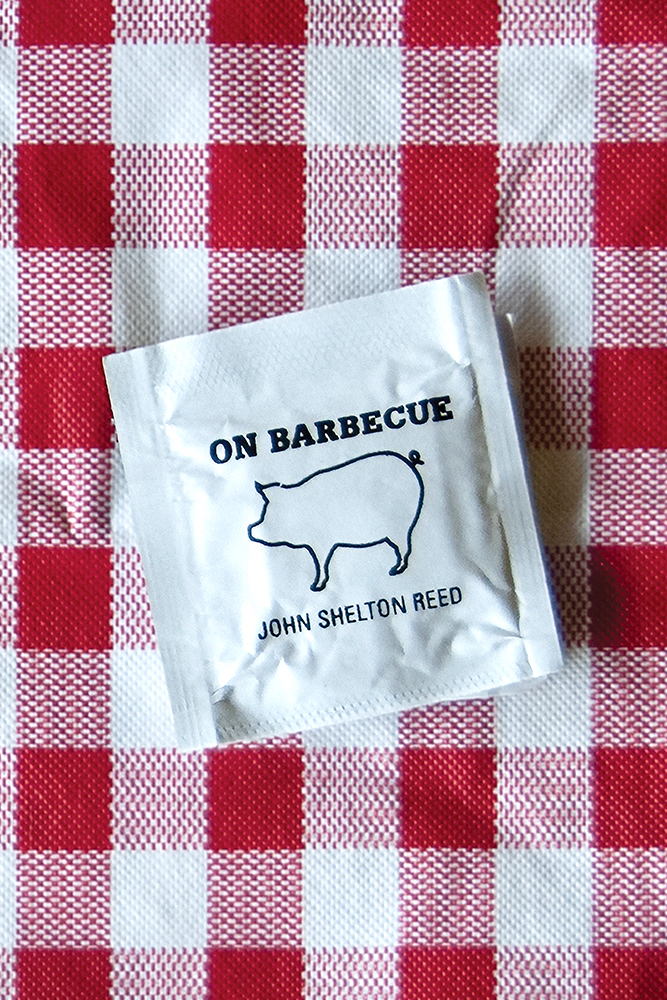The Language of the Heart
Vince Vawter’s semi-autobiographical novel for children is about overcoming obstacles
When the unnamed narrator of Paperboy, Vince Vawter’s semi-autobiographical novel for children, agrees to take over his best friend Rat’s paper route for a month during the summer after sixth grade, he has no inkling of the complicated events about to unfold. Set in Memphis, Tennessee, in 1959, Paperboy tells the story of that summer month and what it means to one introspective young boy trying to understand the confusing ways of a wider world. “I was an eleven-year-old kid standing on a street corner in Memphis in short pants,” he remembers. “I felt like I was so small that I would be blown away if the slightest puff of wind came up. But you didn’t have to worry about any kind of a breeze showing up on a late July afternoon in Memphis.”
 Because he is unable to say even his own name without stuttering, he avoids using it. “I probably get over things that hurt faster than most kids,” he writes. “I don’t have much of a choice seeing as how my stuttering hurts me so many times during a day.” Nevertheless, he has learned a few tricks to help him push out the sounds that get stuck. Singing the words sometimes helps, and so does shouting. Doing something physical—swinging or tossing a pencil in the air and catching it as he speaks—can work, too. What mostly helps, though, is a technique he learned from his speech therapist: “Gentle Air” involves pushing out a little breath prior to attempting a difficult sound. “When I feel like I’m going to have trouble saying a word,” he explains, “I try to sneak up on it by making a hissing noise. When you’re eleven years old it’s better to be called a snake than a retard.”
Because he is unable to say even his own name without stuttering, he avoids using it. “I probably get over things that hurt faster than most kids,” he writes. “I don’t have much of a choice seeing as how my stuttering hurts me so many times during a day.” Nevertheless, he has learned a few tricks to help him push out the sounds that get stuck. Singing the words sometimes helps, and so does shouting. Doing something physical—swinging or tossing a pencil in the air and catching it as he speaks—can work, too. What mostly helps, though, is a technique he learned from his speech therapist: “Gentle Air” involves pushing out a little breath prior to attempting a difficult sound. “When I feel like I’m going to have trouble saying a word,” he explains, “I try to sneak up on it by making a hissing noise. When you’re eleven years old it’s better to be called a snake than a retard.”
 Aside from his stutter, the narrator is a pretty average 1950s kid. He lives with his mom and dad and their imperturbable and fiercely loyal housekeeper, Mam, who calls him “Little Man” and is his “best friend in all the world except when it comes to playing ball and then Rat takes over.” Aside from baseball, the narrator also loves typing. When attempting to speak, he is careful to “choose words that felt like they had some kind of a chance of coming out of my mouth,” he writes. “I always picked my way around words and sounds in sentences like I walked around broken bottles and dog turds in alleys.” But typing frees him to use his full vocabulary, and he uses it to tell this story in a simple, straightforward style.
Aside from his stutter, the narrator is a pretty average 1950s kid. He lives with his mom and dad and their imperturbable and fiercely loyal housekeeper, Mam, who calls him “Little Man” and is his “best friend in all the world except when it comes to playing ball and then Rat takes over.” Aside from baseball, the narrator also loves typing. When attempting to speak, he is careful to “choose words that felt like they had some kind of a chance of coming out of my mouth,” he writes. “I always picked my way around words and sounds in sentences like I walked around broken bottles and dog turds in alleys.” But typing frees him to use his full vocabulary, and he uses it to tell this story in a simple, straightforward style.
Though he is happy to help out Rat with the paper route, he fears the reactions of Rat’s customers when they first notice his own speech impediment. “The reason I hate talking to people who don’t know me is because when they first see me I look like every other kid,” he says. “Two eyes. Two arms. Two legs. Crew-cut hair. Nothing special. But when I open my mouth I turn into something else. Most people don’t take the time to try to understand what’s wrong with me and probably just figure I’m not right in the head. They try to get rid of me as fast as possible.” He begins to relax a little once he makes the acquaintance of Mr. Spiro, a friendly Greek merchant marine who lives on his route. Mr. Spiro has traveled all over the world, and his house is filled with books. A patient listener and lifelong student of philosophy and history, the older man sympathizes with the boy’s struggles and tries to answer his questions and help him interpret the often bewildering circumstances in which he finds himself. To the narrator’s delight, Mr. Spiro quotes Voltaire: “Speech was given to man to disguise his thoughts.”
No less intriguing is the beautiful but troubled Mrs. Worthington, whom the boy finds to be an object of equal parts attraction and pity. He is puzzled and saddened by the often alcohol-fueled incidents he witnesses at her house, so he tries to concentrate instead on doing a good job for Rat. To that end, he takes his knife—needed to cut apart the bales of newspapers and prepare them for delivery—to a disreputable local junkman for sharpening. But the man, Ara T, refuses to return it, and the boy decides to take matters into his own hands, embarking on an odyssey that forces him to confront the racism, crime, and violence hidden beneath his own familiar world.
Memphis native Vince Vawter is a retired journalist—a veteran of newspapers in Memphis and Knoxville, among others—who lives now in Louisville, Tennessee. Vawter’s debut novel is a rare treat: Paperboy is a gentle coming-of-age story that manages to be smart, funny, poignant, and original—the perfect marriage of style and substance. This eleven-year-old paperboy speaks from the heart, in a narrative voice that rings clear and true.
[This review appeared originally on May 7, 2013.]
Vince Vawter will will appear at the twenty-fifth annual Southern Festival of Books, held in Nashville October 11-13. All festival events are free and open to the public.


